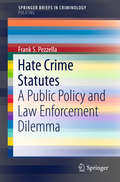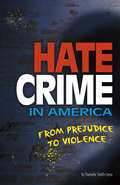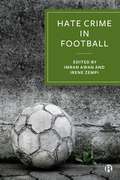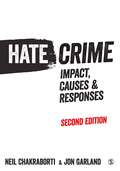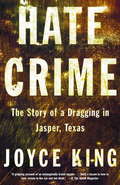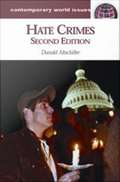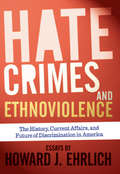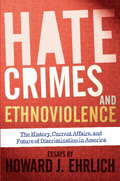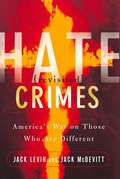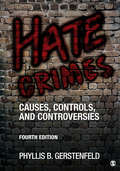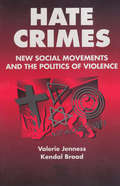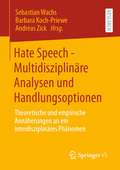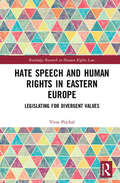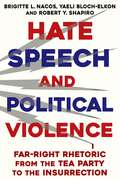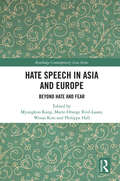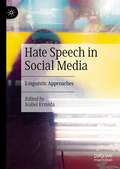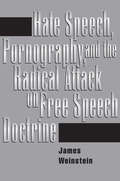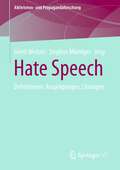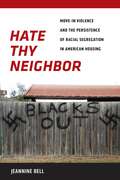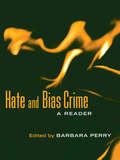- Table View
- List View
Hate Crime Statutes
by Frank S. PezzellaThis Brief provides a clearly outlined and accessible overview of the challenges in creating and enforcing hate crime legislation in the United States. As the author explains, while it is generally not controversial that hate crime behavior should be stopped, the question of how to do so effectively is complex. This volume begins with an introduction about defining hate crimes, and the history of hate crimes and hate crime legislation in the United States. The author shows arguments in favor of hate crime statutes, for example: hate crimes reach beyond their victims to members of the victims' protected group and cohesion of society at large, and should therefore carry higher penalties. The author also shows arguments against hate crime statutes, for example that they sometimes contain enhanced penalties for certain specially protected groups and not others, and have a high potential for ambiguity and uneven enforcement. From a law enforcement perspective, the author explores the practical challenges in enforcing these statutes, and solutions to address them. Investigative techniques and resources vary significantly across police departments, as does training to identify and distinguish hate crimes from ordinary crimes. There is high potential for law enforcement and prosecutors' personal biases to effect the classification of crimes as hate crimes. Law enforcement organizations are constantly faced with the dilemma of what and how to enforce legislation. This brief will be relevant for researchers in criminology and criminal justice, policy makers involved in hate crime legislation, social justice, and police-community relations, as well as related fields such as sociology, public policy and demography.
Hate Crime in America: From Prejudice to Violence (Informed!)
by Danielle Smith-LleraHate crime in the United States is on the rise. The FBI has reported that hate crimes rose by 17 percent in 2017, increasing for the third straight year, and the trend continued into 2018 and 2019. The crimes are most commonly motivated by hatred related to race, ethnicity, or country of origin. Many crimes are also motivated by bias against sexual orientation or gender identity. Students will learn why hate crime is on the rise and how they can help combat it.
Hate Crime in Football: How Racism Is Destroying the Beautiful Game
by Imran Awan and Irene ZempiRates of hate crime within football have been increasing, despite the visibility of anti-racist actions such as ‘taking the knee’. With a unique collection of testimonies, this book shows that hostility is a daily occurrence for some professional football players, ranging from online threats to physical intimidation and violence at football matches. Bringing a range of perspectives to this widespread problem, leading academics, practitioners and policy makers shed light on the best strategies to tackle racism, homophobia, transphobia and misogyny in football.
Hate Crime in India: Understanding Nuanced Discrimination Against North-Eastern Population
by G. S. Bajpai Garima Pal Tusha Singh Advait TambeThis book investigates perceptions against the people of north-east India, and why such prejudicial attitude exists. It subsequently quantifies and develops measures to counter such stereotypes and affiliated violence. This research examines the north-east Indian population’s and the general Indian population’s understanding of hate crime against the north-eastern population in metropolitan cities of India, both in concept and in perpetration. Further, it evaluates the existing constitutional and statutory provisions in India to determine if the proposed legislation and provisions are sufficient with regards to hate crime against north-eastern people of India. Drawing on empirical research addressing racial hate crimes in Delhi, Mumbai, Bengaluru, Chennai, Hyderabad and Pune, this book’s case studies provide a qualitative dive to the problem and offer experiential analysis in order to curate preventive measures. This book is ideal for scholars, researchers, teachers and students interested in hate crime, racial violence, minority struggles, victimology, and law.
Hate Crime: Concepts, Policy, Future Directions
by Neil ChakrabortiHate crime has become an increasingly familiar term in recent times as problems of bigotry and prejudice continue to pose complex challenges for societies across the world. Although greater recognition is now afforded to hate crimes and their associated harms, the problem is still widespread and many key questions remain unanswered. Are we doing enough to protect vulnerable members of society? Are we doing enough to address the offending behaviour of hate crime perpetrators? Are there better ways of understanding and responding to hate crime? This book brings together contributions from leading experts in the field to address these and other contested issues in this fascinating and often controversial subject area. Drawing upon innovative work being undertaken nationally and internationally, the book offers fresh ideas on hate crime scholarship and policy and in so doing enables readers to re-evaluate the concept of hate crime in the light of fresh research, theory and policy. It provides much-needed ways of taking the ‘hate debate’ forward as well as offering practical suggestions for developing both scholarship and policy in a more progressive manner.
Hate Crime: Impact, Causes and Responses
by Jon Garland Neil Chakraborti'Hate Crime is essential reading for researchers, students and practitioners seeking to understand this complex and contested subject. It is thoroughly researched and theoretically informed, but will be accessible to newcomers to the field and to people delivering practical responses to offending and victimisation. Clearly written and with case-study illustrations, Chakroborti and Garland bring this challenging subject to the reader in a vivid and readable form.' - Ben Bowling, Professor of Criminology, King's College, London. This engaging and thought-provoking text provides an accessible introduction to the subject of hate crime. In a world where issues of hatred and prejudice are creating complex challenges for society and for governments, this book provides an articulate and insightful overview of how such issues relate to crime and criminal justice. It offers comprehensive coverage, including topics such as: " racist hate crime " religiously motivated hate crime " homophobic crime " gender and violence " disablist hate crime The book considers the challenges involved in policing hate crime, as well as exploring the role of the media. Legislative developments are discussed throughout. Chapter summaries, case studies, a glossary and advice on further reading all help to equip the reader with a clear understanding of this nuanced and controversial subject. Hate Crime is essential reading for students and academics in criminology and criminal justice.
Hate Crime: Impact, Causes and Responses
by Jon Garland Neil ChakrabortiHate crime is a particularly pernicious form of criminal behaviour that has significant impacts upon victims, their families and wider communities. In this substantially revised and updated edition the book examines the nature, extent and harms of hate crime, and the effectiveness of criminal justice responses to it. It covers racist, religiously motivated, homophobic, disablist and transphobic hate crime, as well as other forms of targeted victimisation such as gendered hostility, elder abuse, attacks upon alternative subcultures and violence against sex workers and the homeless. The book also assesses the complexities and controversies surrounding hate crime legislation and policy-making, as well as the continuing challenges associated with the policing of hate. The second edition features expanded discussions of international perspectives and contemporary topics such as online hate and cyberbullying, as well as numerous case studies covering issues such as lone wolf extremists, Islamophobia, asylum seekers and the far right. The book contains a range of links to online material that accompany the extensive lists of further reading in each chapter.
Hate Crime: The Story of a Dragging in Jasper, Texas
by Joyce KingOn June 7, 1998, James Byrd, Jr., a forty-nine-year-old black man, was dragged to his death while chained to the back of a pickup truck driven by three young white men. It happened just outside of Jasper, a sleepy East Texas logging town that, within twenty-four hours of the discovery of the murder, would be inextricably linked in the nation's imagination to an exceptionally brutal, modern-day lynching. In this superbly written examination of the murder and its aftermath, award-winning journalist Joyce King brings us on a journey that begins at the crime scene and extends into the minds of the young men who so casually ended a man's life. She takes us inside the prison in which two of them met for the first time, and she shows how it played a major role in shaping their attitudes--racial and otherwise. The result is a deeply engrossing psychological portrait of the accused and a powerful indictment of the American prison system's ability to reform criminals. Finally, King writes with candor and clarity about how the events of that fateful night have affected her--as a black woman, a native Texan, and a journalist given the agonizing assignment of covering the trials of all three defendants. More than a spectacular true-crime debut, Hate Crime is a breathtaking work of reportage and a searing look at how the question of race continues to shape life in America.
Hate Crimes (2nd edition)
by Donald AltschillerHow are hate crimes different from other crimes committed against individuals? Should the legal penalties be harsher? These questions and many more are explored in Hate Crimes, the first reference source on this important topic. This volume includes an overview of legislation, statistics on hate crimes, and biographies of individuals combating violent extremist activities. A historical survey of the main targets of hate crimes—gays and lesbians, Jews, African Americans, and Asian Americans—is also featured.
Hate Crimes and Ethnoviolence: The History, Current Affairs, and Future of Discrimination in America
by Howard J EhrlichOver the past twenty years, Howard J. Ehrlich conducted the first national surveys of ethnoviolence, helped design the protocol for identifying hate crimes, and has served as the director of The Prejudice Institute. This collection of essays is the result of his unparalleled research in this vital area of study. Ehrlich introduces the ten dimensions of America?s social heritage that are necessary for a complete understanding of prejudice and coherently explains the complex differences between ethnoviolence and hate crimes. Through analysis of network television news programs and in-depth interviews with newspaper editors and reporters, Ehrlich explores how our mainstream media maintains racial and ethnic stereotypes. Case studies (the Oklahoma City bombing, Rodney King riots, Columbine High School shootings, and Hurricane Katrina) show how traumatic events are manipulated by political elites and the news media to shape intergroup relations. Ehrlich concludes with a personal and political look at the concentration of power in the United States and the increasing incidence of political ignorance as a tool of oppression.
Hate Crimes and Ethnoviolence: The History, Current Affairs, and Future of Discrimination in America
by Howard J. EhrlichIlluminating and empirically grounded collection of essays by noted scholar and activist Howard Ehrlich, who chronicles his unparalleled experience in ethnoviolence and hate crimes research
Hate Crimes in Cyberspace
by Danielle Keats CitronMost Internet users are familiar with trollingâe"aggressive, foul-mouthed posts designed to elicit angry responses in a siteâe(tm)s comments. Less familiar but far more serious is the way some use networked technologies to target real people, subjecting them, by name and address, to vicious, often terrifying, online abuse. In an in-depth investigation of a problem that is too often trivialized by lawmakers and the media, Danielle Keats Citron exposes the startling extent of personal cyber-attacks and proposes practical, lawful ways to prevent and punish online harassment. A refutation of those who claim that these attacks are legal, or at least impossible to stop, Hate Crimes in Cyberspace reveals the serious emotional, professional, and financial harms incurred by victims. Persistent online attacks disproportionately target women and frequently include detailed fantasies of rape as well as reputation-ruining lies and sexually explicit photographs. And if dealing with a single attackerâe(tm)s âeoerevenge pornâe#157; were not enough, harassing posts that make their way onto social media sites often feed on one another, turning lone instigators into cyber-mobs. Hate Crimes in Cyberspace rejects the view of the Internet as an anarchic Wild West, where those who venture online must be thick-skinned enough to endure all manner of verbal assault in the name of free speech protection, no matter how distasteful or abusive. Cyber-harassment is a matter of civil rights law, Citron contends, and legal precedents as well as social norms of decency and civility must be leveraged to stop it.
Hate Crimes revisited: America's War Against Those Who are Different
by Jack Mcdevitt Jack LevinHate crimes-violence aimed at individuals because they are members of a particular group-were once considered the rare illegal actions of a small but vocal assortment of extremists who thrived on hating minorities. No more. In this new book by two of the country's leading experts on hate crimes, published ten years after their classic book of the same name, these most-recognized authorities and media commentators reinterpret this scourge of our generation-hatred based on race, religion, sexual orientation, ethnicity, gender, and even citizenship. In the aftermath of the worst act of terrorism in this country's history-the bombing of the World Trade Center on September 11, 2001-the authors probe the causes and characteristics of such acts of hatred and, most vitally, their consequences for all of us.
Hate Crimes: Causes, Controls, and Controversies
by Phyllis B. GerstenfeldThe Fourth Edition of Hate Crimes: Causes, Controls, and Controversies takes a multidisciplinary approach that allows students to explore a broad scope of hate crimes. Drawing on recent developments, topics, and current research, this book examines the issues that foster hate crimes while demonstrating how these criminal acts impact individuals, as well as communities. Students are introduced to the issue through first-person vignettes—offering a more personalized account of both victims and perpetrators of hate crimes. Packed with the latest court cases, research, and statistics from a variety of scholarly sources, the Fourth Edition is one of the most comprehensive and accessible textbooks in the field.
Hate Crimes: Causes, Controls, and Controversies
by Phyllis B. GerstenfeldThe Fourth Edition of Hate Crimes: Causes, Controls, and Controversies takes a multidisciplinary approach that allows students to explore a broad scope of hate crimes. Drawing on recent developments, topics, and current research, this book examines the issues that foster hate crimes while demonstrating how these criminal acts impact individuals, as well as communities. Students are introduced to the issue through first-person vignettes—offering a more personalized account of both victims and perpetrators of hate crimes. Packed with the latest court cases, research, and statistics from a variety of scholarly sources, the Fourth Edition is one of the most comprehensive and accessible textbooks in the field.
Hate Crimes: New Social Movements and the Politics of Violence (Social Problems And Social Issues Ser.)
by Valerie JennessViolence directed at victimized groups because of their real or imagined characteristics is as old as humankind. Why, then, have "hate crimes" only recently become recog-nized as a serious social problem, especially in the United States? This book addresses a timely set of questions about the politics and dynamics of intergroup violence manifested
Hate Speech - Multidisziplinäre Analysen und Handlungsoptionen: Theoretische und empirische Annäherungen an ein interdisziplinäres Phänomen
by Sebastian Wachs Andreas Zick Barbara Koch-PrieweDass Hate Speech ein zentrales wie hoch relevantes Thema ist, bedarf kaum noch der Erwähnung, weil sie in den letzten Jahren mit einer zunehmenden Polarisierung und Radikalisierung in vielen Gesellschaften präsenter geworden ist. Da sich in den letzten Jahren ganz unterschiedliche Disziplinen unabhängig voneinander dem Phänomen „Hate Speech“ genähert haben, erscheint ein interdisziplinärer Überblick zu diesem Thema notwendig. In diesem Sammelband tragen Expert*innen Beiträge zu Definitionen, Möglichkeiten der theoretischen und empirischen Bearbeitung sowie Handlungsoptionen zusammen. In dem ersten Abschnitt werden multidisziplinäre Analysen präsentiert, wobei es u.a. um Forschung, Modelle und Theorien zu Hate Speech geht. In dem zweiten Abschnitt stehen die Konsequenzen und praktische Reaktionsmöglichkeiten auf Hate Speech sowie Einblicke in die Präventionsarbeit im Vordergrund. Das Ziel des Sammelbands ist es, Wissen, Erfahrungen und Ideen zu bündeln und die Leser*innen zu weiter gehenden Reflexionen anzuregen.
Hate Speech and Human Rights in Eastern Europe: Legislating for Divergent Values (Routledge Research in Human Rights Law)
by Viera PejchalHate Speech and Human Rights. Democracies need to understand these terms to properly adapt their legal frameworks. Regulation of hate speech exposes underlining and sometimes invisible societal values such as security and public order, equality and non-discrimination, human dignity, and other democratic vital interests. The spread of hatred and hate speech has intensified in many corners of the world over the last decade and its regulation presents a conundrum for many democracies. This book presents a three-prong theory describing three different but complementary models of hate speech regulation which allows stakeholders to better address this phenomenon. It examines international and national legal frameworks and related case law as well as pertinent scholarly literature review to highlight this development. After a period of an absence of free speech during communism, post-communist democracies have sought to build a framework for the exercise of free speech while protecting public goods such as liberty, equality and human dignity. The three-prong theory is applied to identify public goods and values underlining the regulation of hate speech in the Czech Republic and Slovakia, two countries that share a political, sociological, and legal history, as an example of the differing approaches to hate speech regulation in post-communist societies due to divergent social values, despite identical legal frameworks. This book will be of great interest to scholars of human rights law, lawyers, judges, government, NGOs, media and anyone who would like to understand values that underpin hate speech regulations which reflect values that society cherishes the most.
Hate Speech and Political Violence: Far-Right Rhetoric from the Tea Party to the Insurrection
by Brigitte L. Nacos Yaeli Bloch-Elkon Robert ShapiroHow did the United States descend into crisis, with institutions frayed, political violence mounting, and democracy itself in peril? This timely book identifies how the Tea Party and its extremist narratives laid the groundwork for the rise of Donald Trump, his MAGA movement, and the January 6, 2021, assault on the Capitol.Brigitte L. Nacos, Yaeli Bloch-Elkon, and Robert Y. Shapiro trace the escalation of a strain of extremist rhetoric in right-wing political discourse after the inauguration of Barack Obama. Drawing on extensive and in-depth analysis of political communication in both traditional media and online spaces, they demonstrate how the dominant rhetorical styles of the Trump era were pioneered by the Tea Party. A backlash to the election of the first Black president, this reactionary social movement deployed violent language and spread anti-Obama paranoia, with the assistance of media insiders, GOP leaders, and conservative advocacy groups. Donald Trump rose to political prominence by hitching himself to the “birther” racist conspiracy theory, espoused by many Tea Partiers, and drew from their aggressive and hyperpartisan repertoire. Ultimately, this book shows, the increasingly violent rhetoric of right-wing extremists spilled over into real-world political violence. Revealing the path the Tea Party blazed to Trump and the insurrectionists, Hate Speech and Political Violence provides timely new insights into the threats facing American democracy.
Hate Speech in Asia and Europe: Beyond Hate and Fear (Routledge Contemporary Asia Series)
by Myungkoo Kang Marie-Orange Rivé-Lasan Wooja Kim Philippa Hall Sojeong ParkThis edited collection provides a timely review of the current state of hate speech research in Asia and Europe, through the comparative examples of Korea, Japan and France. Extending the study of hate speech studies beyond the largely western emphasis on European and US contexts dominant in the field, this book’s comparative framework aims to examine hate speech as a global phenomenon spanning Asian and European contexts. An innovative range of nuanced empirical case studies explore hate speech by analyzing gendered hate speech and nationality, French cartoon humour, official counter radicalization narratives and the use of international law to inform domestic legislation in the Philippines and Japan. A fresh perspective on Asian and European hate speech, this book’s evaluation of current of hate speech research also identifies future directions for the development of theory and method. Filling a critical gap in the literature, Hate Speech in Asia and Europe will appeal to students and scholars of law, politics, religion, history, social policy and social science more broadly, as well as Asian Studies.
Hate Speech in Social Media: Linguistic Approaches
by Isabel ErmidaThis edited book offers insight into the linguistic construction of prejudice and discrimination in social media. Drawing on the outputs of a three-year research project, NETLANG, involving scholars from five European countries (Portugal, Czech Republic, Estonia, Finland and Poland), as well as on external contributions from participants in the project’s final conference, the collection brings together a variety of linguistic approaches to the study of online hate speech, ranging from Pragmatics to Syntax, Lexis, Stylistics, Natural Language Processing (NLP) and Corpus Linguistics. Data from English, Portuguese, Danish, Lithuanian, Persian, Polish, and Slovenian are examined, along with various geopolitical contexts for hate speech, especially anti-refugee and anti-immigrant discourse. The authors explore a continuum of overt to covert textual data, namely: (i) structural elements, such as syntactic and morphological patterns found to recur throughout the texts; (ii) lexical and stylistic elements, revealing the often implicit ways vocabulary choices and rhetorical devices signal the expression of hate; and (iii) interactional elements, concerning the pragmatic relationships established in online communicative exchanges. The chapters cover numerous types of prejudice, such as sexism, nationalism, racism, antisemitism, religious intolerance, ageism, and homo/transphobia. The book will be of interest to an academic readership in Linguistics, Media Studies, Communication Studies, and Social Sciences.
Hate Speech, Pornography, and Radical Attacks on Free Speech Doctrine
by James Weinstein<p>Does American free speech doctrine discriminate against women and minorities? In Hate Speech, Pornography, and the Radical Attack on Free Speech Doctrine, James Weinstein carefully examines the charge that in interpreting the First Amendment as protecting hate speech and pornography while allowing myriad other exceptions to free speech, American courts have privileged the interests of the rich and powerful over the interests of women and people of color. The author concludes that while free speech doctrine is not in any deep sense as neutral as some of its apologists believe, the claim that free speech decisions and principles systematically discriminate against women and minorities does not withstand scrutiny. He shows that this claim of discrimination is based upon a profound but widely shared misunderstanding of the actual workings of free speech doctrine.In order to expose this misunderstanding, the first section of the book thoroughly explores the basic cases and principles upon which free speech doctrine is built. The second section demonstrates that the relationship between free speech and equality is far more complex than either radical critics or many liberal defenders of doctrine suppose. <p>The third section considers the cost and benefits of modifying free speech doctrine to allow for the suppression of hate speech and pornography. After reviewing the experience of hate speech and pornography in other democracies, Weinstein concludes that while such a modification would not lead straight to totalitarianism as alarmist defenders of current doctrine contend, it would nonetheless likely inhibit legitimate debate and artistic expression. Also contrary to dogmatic defenders of current doctrine, the author concludes that although the scientific evidence that pornography causes violence to women is not nearly as conclusive as radical feminists assert, this evidence is nonetheless cause for concern. <p>While offering a scholarly analysis of the radical critique of free speech doctrine, this book has even larger ambition: to provide nonlawyers with the background to participate knowledgeably in the continuing debate about the role of free speech in a democratic society.</p>
Hate Speech: Definitionen, Ausprägungen, Lösungen (Aktivismus- und Propagandaforschung)
by Universität HamburgHate Speech ist Alltag, egal ob auf der Straße, im Parlament oder im Netz. Menschen werden beleidigt, entwürdigt und man ruft zu Gewalt auf. Die Folgen sind unübersehbar. Hate Speech ist so zu einem gesellschaftsbedrohenden Phänomen avanciert, befeuert durch politische und soziale Krisen wie die Flüchtlingskrise 2015/16 und die Corona-Pandemie 2020/21. Mit diesem Sammelband möchten wir einen Beitrag zu einer strukturierten Reflexion des Phänomens leisten. Dabei werden sprachliche Indikatoren von Hassrede, die Bedeutung von digitaler Kommunikation für Hass und Hetze sowie öffentliche Kommunikation und Hate Speech in der Praxis diskutiert. Ebenso setzt der Band sich mit möglichen politischen, rechtlichen, journalistischen sowie zivilgesellschaftlichen Handlungsoptionen auseinander. Einen besonderen Fokus legen wir dabei auf die journalistische Bearbeitung und digitale Verbreitung von Hate Speech.
Hate Thy Neighbor: Move-In Violence and the Persistence of Racial Segregation in American Housing
by Jeannine BellExamines the role violence plays in maintaining housing segregationDespite increasing racial tolerance and national diversity, neighborhood segregation remains a very real problem in cities across America. Scholars, government officials, and the general public have long attempted to understand why segregation persists despite efforts to combat it, traditionally focusing on the issue of “white flight,” or the idea that white residents will move to other areas if their neighborhood becomes integrated. In Hate Thy Neighbor, Jeannine Bell expands upon these understandings by investigating a little-examined but surprisingly prevalent problem of “move-in violence:” the anti-integration violence directed by white residents at minorities who move into their neighborhoods. Apprehensive about their new neighbors and worried about declining property values, these residents resort to extra-legal violence and intimidation tactics, often using vandalism and verbal harassment to combat what they view as a violation of their territory.Hate Thy Neighbor is the first work to seriously examine the role violence plays in maintaining housing segregation, illustrating how intimidation and fear are employed to force minorities back into separate neighborhoods and prevent meaningful integration. Drawing on evidence that includes in-depth interviews with ordinary citizens and analysis of Fair Housing Act cases, Bell provides a moving examination of how neighborhood racial violence is enabled today and how it harms not only the victims, but entire communities.By finally shedding light on this disturbing phenomenon, Hate Thy Neighbor not only enhances our understanding of how prevalent segregation and this type of hate-crime remain, but also offers insightful analysis of a complex mix of remedies that can work to address this difficult problem.
Hate and Bias Crime: A Reader
by Barbara PerryCovering everything from hate groups and extremist exploits to Black church arsons and the fall out violence from 9/11; this is an important collection that sheds much-needed light on this growing problem.
